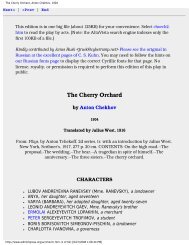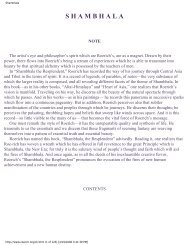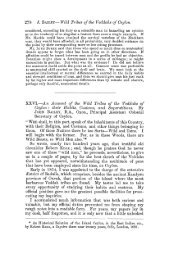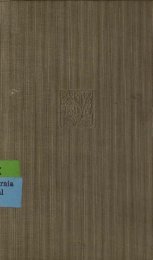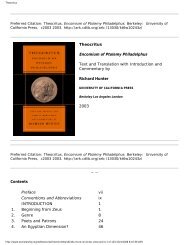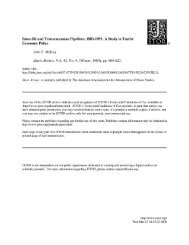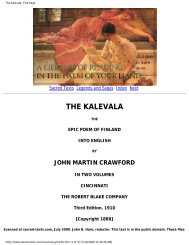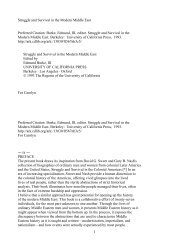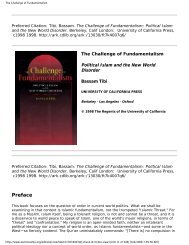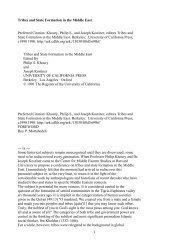Between Two Worlds Kafadar.pdf
Between Two Worlds Kafadar.pdf
Between Two Worlds Kafadar.pdf
You also want an ePaper? Increase the reach of your titles
YUMPU automatically turns print PDFs into web optimized ePapers that Google loves.
ed. Gary Leiser (Albany, 1992).<br />
19. Paul Wittek, Das Füurstentum Mentesche (Istanbul, 1934). A Turkish<br />
translation was made by a student of Köprülü: Mentese * Beyligi * trans. O. S. *<br />
Gökyay (Ankara, 1944).<br />
20. Paul Wittek, The Rise of the Ottoman Empire (London, 1938).<br />
21. Wittek, Mentesche , 35.<br />
22. Mehmet Fuat Köprülü, "Bizans Müesseselerinin Osmanli Müesseselerine Te'siri<br />
Hakkinda Bâzi Mülâhazalar," Türk Hukuk ve Iktisat * Tarihi Mecmuasi<br />
1(1931):165-313. "Les institutions byzantines ont-elles joué un rôle dans la<br />
formation des institutions ottomanes?" VIIe Congrès International des Sciences<br />
Historiques: Résumé ... (Warsaw, 1933), 1:297-302, is a French summary of this<br />
work, which is now published as a book in three languages: Alcune osservazioni<br />
intorno all'influenza delle istituzioni bizantine sulk istituzioni ottomane<br />
(Rome, 1953); by the original title in Turkish, with additional notes by Orhan<br />
Köprülü (Istanbul, 1981); Some Observations on the Influence of Byzantine<br />
Institutions on Ottoman Institutions, trans. G. Leiser (Ankara, 1993).<br />
23. The introduction of Durkheimian sociology is attributed to Ziya Gökalp, the<br />
sociologist who was the mentor of a whole generation of nationalists in the<br />
early twentieth century. As a student of "Gökalp's disciple, Mehmed Fuad<br />
Köprülü," Halil Inalcik * is conscious of this legacy; see his "Impact of the<br />
Annales School on Ottoman Studies and New Findings," Review 1(1978):69-70.<br />
Inalcik * has also written a more detailed assessment of Gökalp's sociology:<br />
"Sosyal Degisme * , Gökalp ve Toynbee," Türk Kültürü 3/31 (May 1965):421-33.<br />
24. Köprülü, Origins, 24.<br />
25. Lucien Fevbre, "Review of Köprülü, Les origines de l'empire ottoman,"<br />
Annales: ESC 9(1937):100-101. Lengthy passages of this review were cited with<br />
relish by Köprülü in his introduction to the Turkish edition; see pp. xxi-xxiii<br />
in the English translation.<br />
26. Köprülü, Origins, xxiii. Here I had to change the translator's "had" to<br />
"have" because it is a more accurate rendering of the tense in the original<br />
Turkish sentence (" mislardir * " and not "mislardi * )'' and thus of the<br />
likelihood that there is an implicit critique of Wittek here, always appreciated<br />
as a good philologist even by his critics. Köprülü had already raised the same<br />
criticism against Wittek's "monocausal" explanation more directly in "Osmanli<br />
Imparatorlugunun * Etnik Mensei * Meseleleri," Belleten 7(1943):285-86.<br />
27. Köprülü, Origins, 11-21.<br />
28. Ibid., 86-87.<br />
29. Ibid., 87-88.<br />
30. The sun-language theory claimed, on the basis of a heliocentric view of the<br />
origin and nature of human languages, that Turkish was the Ur-language from<br />
which all civilized languages derived. See Busra * Ersanli Behar, Iktidar * ve<br />
Tarih: Türkiye'de "Resmi Tarih" Tezinin Olusumu * (1929-1937) (Istanbul, 1992),<br />
175-81.<br />
31. While it may be accurate to state that "the greatest single influence on<br />
modem perceptions of early Ottoman history has been the work of the scholar Paul<br />
Wittek," it is misleading to add that Wittek's gaza thesis "appealed to<br />
everyone: Turkish nationalists can see Wittek's gazis, or Holy Warriors, as the<br />
embodiment of Turkish-Islamic heroism" (Imber, The Ottoman Empire, 12-13). There<br />
was a good deal of shared ground between Wittek and Köprülü; in addition to what<br />
141



